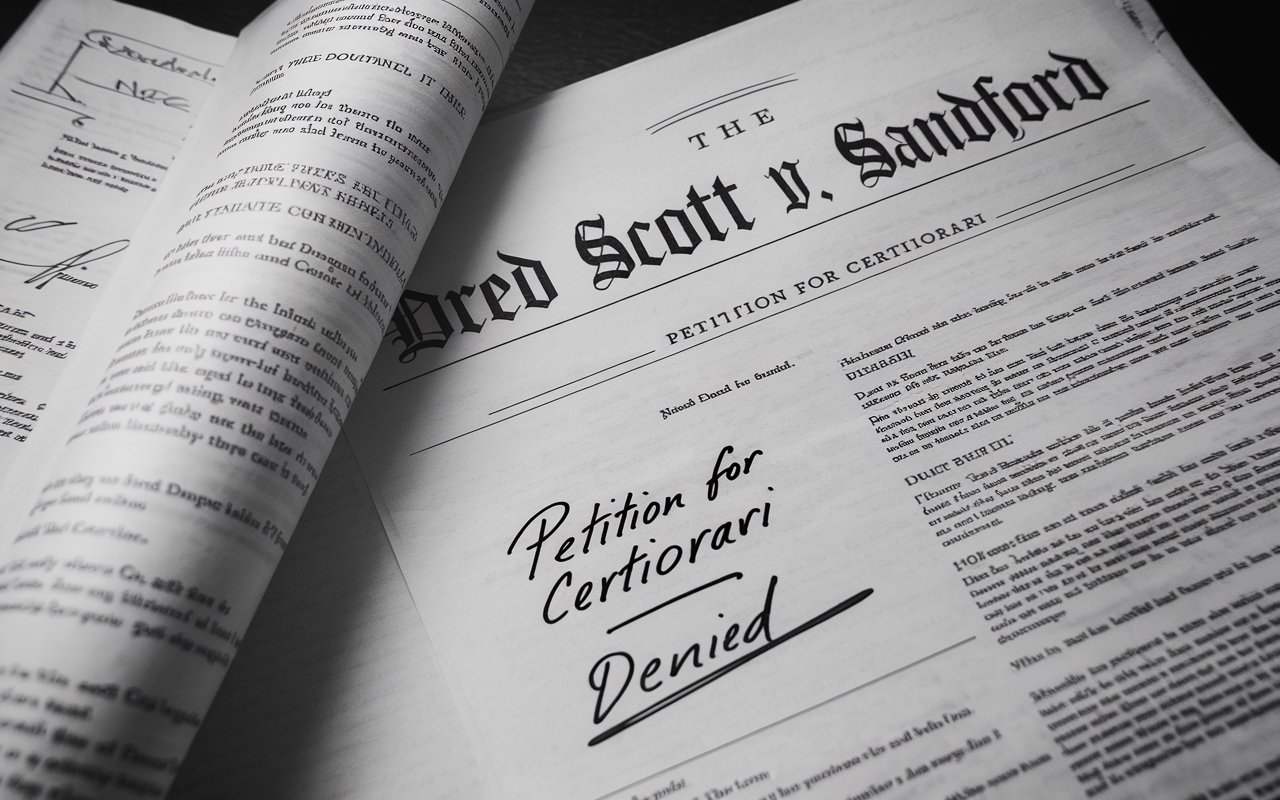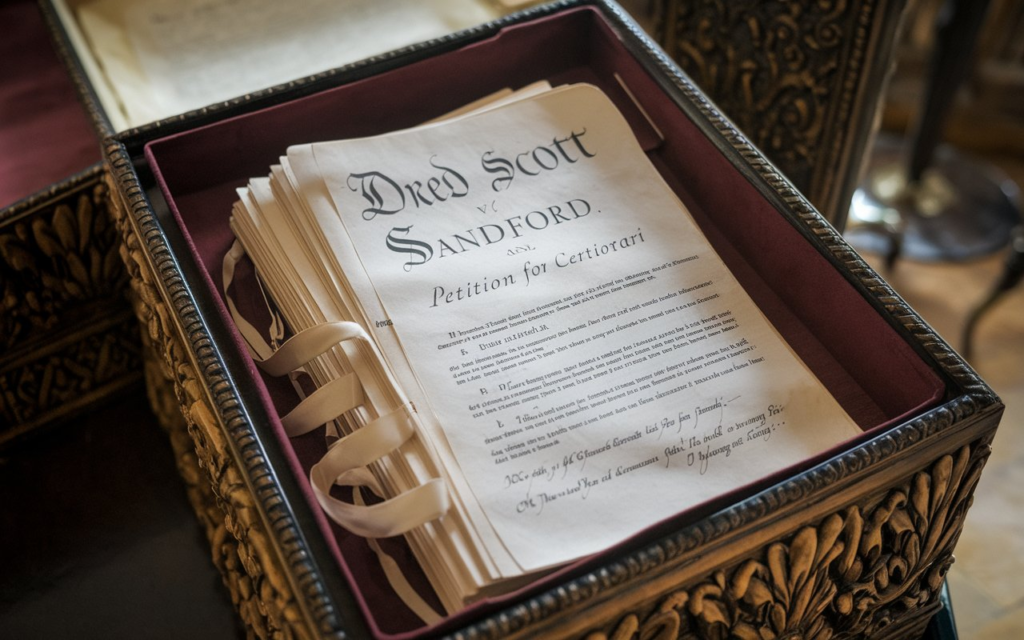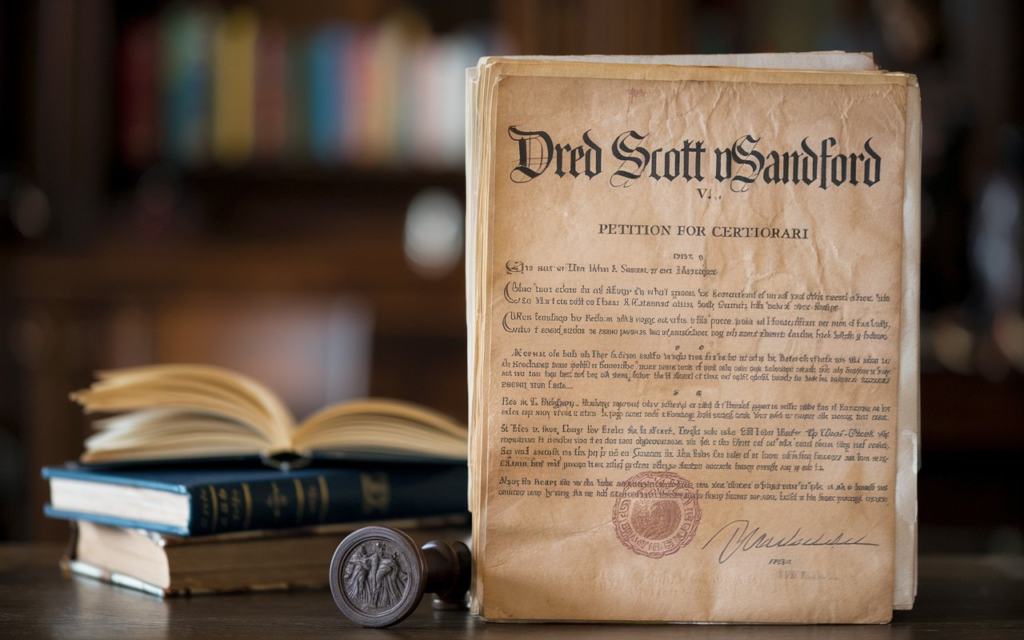Introduction
The Dred Scott v Sandford Petition for Certiorari represents a pivotal moment in U.S. legal history, though the concept of certiorari was not formally used then. This case centered on Dred Scott, an enslaved man who sought legal recognition of his freedom after living in free territories. The Supreme Court’s decision, which denied Scott’s claim and declared that African Americans could not be U.S. citizens, highlighted deep divisions in the nation. Although “petition for certiorari” is a modern term, the case’s journey to the Court marked a significant legal precedent that reshaped the national debate over slavery and citizenship rights.
Understanding the Dred Scott v Sandford Petition for Certiorari
The term Dred Scott v Sandford Petition for Certiorari may appear out of place historically, as the modern certiorari system was not in effect when this case was decided in 1857. However, the case reached the Supreme Court after lower courts heard Scott’s lawsuit for freedom. The petition, in essence, was Scott’s effort to secure judicial review of his claim that he had become free after residing in free territories. The Supreme Court’s acceptance of the case paved the way for a decision that would shape the future of American law and politics.
The Origins of the Dred Scott v. Sandford Case
The Dred Scott v Sandford Petition for Certiorari arose from Dred Scott’s long fight for freedom. Scott, an enslaved man, argued that his extended residence in Illinois, a free state, and the Wisconsin Territory, where slavery was prohibited, made him legally free. His claim reached Missouri state courts, where conflicting rulings eventually sent the case toto federal courts. This journey demonstrated the legal complexities of slavery and freedom in a deeply divided nation, setting the stage for a landmark Supreme Court ruling.
The Journey to the Supreme Court
When the Dred Scott v Sandford Petition for Certiorari reached the Supreme Court, the nation was already fraught with tensions over slavery. Although modern petitions for certiorari ask for a discretionary review, Scott’s case highlighted an urgent constitutional question about citizenship and federal authority over slavery. The Court’s agreement to hear the case signified its willingness to address these divisive issues, even as it risked inflaming national unrest. The Court’s involvement would mark a critical juncture in American history.
Chief Justice Taney and His Role
In deciding the Dred Scott v Sandford Petition for Certiorari, Chief Justice Roger B. Taney delivered a ruling far beyond Scott’s freedom. Taney’s opinion denied Scott’s claim to citizenship and argued that enslaved individuals and their descendants had no rights under the Constitution. His reasoning went further to declare that Congress had no authority to regulate slavery in the territories. This interpretation of the petition underscored Taney’s broader vision of constitutional limits, which proved highly controversial.
The Constitutional Questions at Stake
The Dred Scott v Sandford Petition for Certiorari forced the Court to confront fundamental constitutional issues. Could Congress regulate slavery in federal territories? Did African Americans, free or enslaved, have the right to sue in federal courts? These questions reached the heart of the nation’s debates over slavery and federalism. The Court’s answers would ripple through legal and political spheres, exposing deep flaws in the Union’s ability to reconcile freedom and slavery.
The Decision’s Impact on Citizenship
One of the most controversial aspects of the Dred Scott v Sandford Petition for Certiorari was the Court’s assertion that African Americans could not be citizens. This decision erased any legal standing for Scott’s claims and effectively denied citizenship rights to an entire group of people. This ruling not only crushed Scott’s hopes for freedom but also set a dangerous precedent, reinforcing systemic racial inequality within the nation’s legal framework.
Declaring the Missouri Compromise Unconstitutional
A key outcome of the Dred Scott v Sandford Petition for Certiorari was the Court’s declaration that the Missouri Compromise of 1820 was unconstitutional. This compromise prohibited slavery in certain territories, maintaining a delicate balance between free and enslaved person states. By invalidating this agreement, the Court inflamed sectional tensions and undermined decades of legislative efforts to manage slavery’s expansion, pushing the nation closer to civil war.
Public Reaction to the Ruling
The Supreme Court’s decision on the Dred Scott v Sandford Petition for Certiorari sparked outrage in the North while being celebrated in pro-slavery Southern states. Abolitionists viewed the ruling as a betrayal of justice and a denial of fundamental human rights. At the same time, many in the South saw it as a validation of their social and economic systems. The polarized reaction to the decision revealed the deepening divide that would soon lead to the Civil War.
Long-Term Consequences of the Case
The Dred Scott v Sandford Petition for Certiorari remains one of the most infamous cases in American legal history. Its long-term consequences included the further polarization of the nation over the issue of slavery. The decision also undermined the credibility of the Supreme Court as an impartial arbiter of justice. Ultimately, the case highlighted the inability of legal institutions to resolve the profound moral and political crisis of slavery.
Lessons from Dred Scott v. Sandford
The Dred Scott v Sandford Petition for Certiorari is a stark reminder of how legal rulings can perpetuate injustice when influenced by societal prejudice. The case demonstrates the dangers of narrowly interpreting the Constitution to uphold systemic inequality. Although later overturned by the Civil War and constitutional amendments, the case underscores the critical importance of ensuring that the law protects the fundamental rights of all individuals, regardless of race or status.
Conclusion
The Dred Scott v Sandford Petition for Certiorari is a defining moment in American history, symbolizing the deep flaws in the nation’s legal and moral fabric at the time. The Supreme Court’s ruling not only denied Dred Scott his freedom but also reinforced the systemic denial of citizenship and rights to African Americans. By striking down the Missouri Compromise, the decision escalated tensions between the North and South, contributing to the outbreak of the Civil War. Although ultimately overturned by constitutional amendments, the case remains a powerful reminder of how courts can perpetuate injustice when shaped by prejudice. It underscores the ongoing need for vigilance in protecting equality and justice for all.


